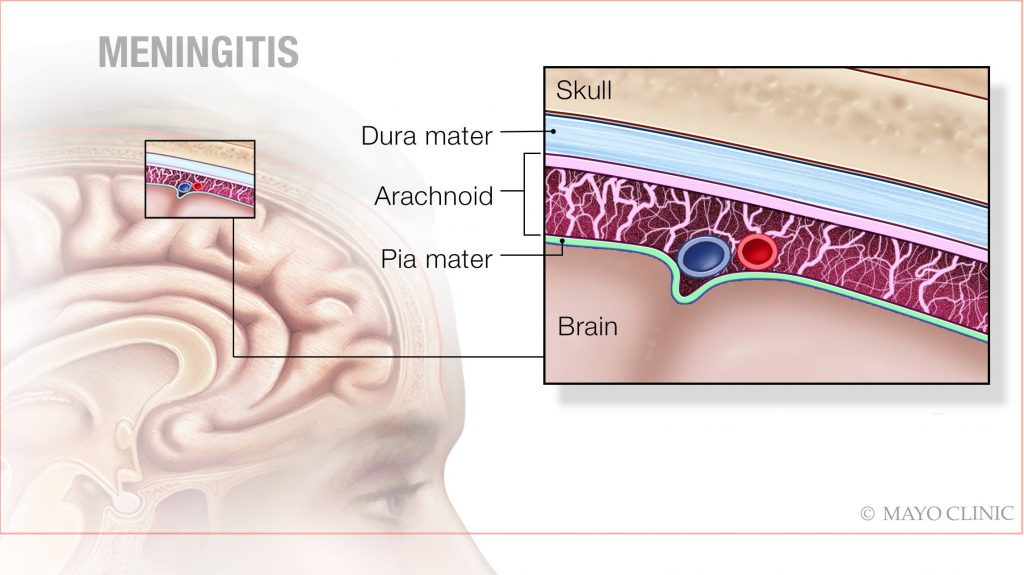-
Meningitis: Inflammation of membranes around your brain and spinal cord

Meningitis is an inflammation of the membranes (meninges) surrounding your brain and spinal cord. The swelling from meningitis typically triggers symptoms such as headache, fever and a stiff neck.
This article is written by Mayo Clinic staff. Find more health and medical information on mayoclinic.org.
____________________________________
Most cases of meningitis in the United States are caused by a viral infection, but bacterial, parasitic and fungal infections are other causes. Some cases of meningitis improve without treatment in a few weeks. Others can be life-threatening and require emergency antibiotic treatment.
Seek immediate medical care if you suspect that someone has meningitis. Early treatment of bacterial meningitis can prevent serious complications.
Symptoms
Early meningitis symptoms may mimic the flu (influenza). Symptoms may develop over several hours or over a few days.
Possible signs and symptoms in anyone older than the age of 2 include:
- Sudden high fever
- Stiff neck
- Severe headache that seems different than normal
- Headache with nausea or vomiting
- Confusion or difficulty concentrating
- Seizures
- Sleepiness or difficulty waking
- Sensitivity to light
- No appetite or thirst
- Skin rash (sometimes, such as in meningococcal meningitis)
Signs in newborns
Newborns and infants may show these signs:
- High fever
- Constant crying
- Excessive sleepiness or irritability
- Inactivity or sluggishness
- Poor feeding
- A bulge in the soft spot on top of a baby's head (fontanel)
- Stiffness in a baby's body and neck
Infants with meningitis may be difficult to comfort, and may even cry harder when held.
When to see a health care provider
Seek immediate medical care if you or someone in your family has meningitis symptoms, such as:
- Fever
- Severe, unrelenting headache
- Confusion
- Vomiting
- Stiff neck
Bacterial meningitis is serious, and can be fatal within days without prompt antibiotic treatment. Delayed treatment increases the risk of permanent brain damage or death.
It's also important to talk to your doctor if a family member or someone you work with has meningitis. You may need to take medications to prevent getting the infection
Causes
Viral infections are the most common cause of meningitis, followed by bacterial infections and, rarely, fungal infections. Because bacterial infections can be life-threatening, identifying the cause is essential.
Bacterial meningitis
Bacteria that enter the bloodstream and travel to the brain and spinal cord cause acute bacterial meningitis. But it can also occur when bacteria directly invade the meninges. This may be caused by an ear or sinus infection, a skull fracture, or, rarely, after some surgeries.
Several strains of bacteria can cause acute bacterial meningitis, most commonly:
- Streptococcus pneumoniae (pneumococcus). This bacterium is the most common cause of bacterial meningitis in infants, young children and adults in the United States. It more commonly causes pneumonia or ear or sinus infections. A vaccine can help prevent this infection.
- Neisseria meningitidis (meningococcus). This bacterium is another leading cause of bacterial meningitis. These bacteria commonly cause an upper respiratory infection but can cause meningococcal meningitis when they enter the bloodstream. This is a highly contagious infection that affects mainly teenagers and young adults. It may cause local epidemics in college dormitories, boarding schools and military bases. A vaccine can help prevent infection.
- Haemophilus influenzae (haemophilus). Haemophilus influenzae type b (Hib) bacterium was once the leading cause of bacterial meningitis in children. But new Hib vaccines have greatly reduced the number of cases of this type of meningitis.
- Listeria monocytogenes (listeria). These bacteria can be found in unpasteurized cheeses, hot dogs and lunchmeats. Pregnant women, newborns, older adults and people with weakened immune systems are most susceptible. Listeria can cross the placental barrier, and infections in late pregnancy may be fatal to the baby.
Viral meningitis
Viral meningitis is usually mild and often clears on its own. Most cases in the United States are caused by a group of viruses known as enteroviruses, which are most common in late summer and early fall. Viruses such as herpes simplex virus, HIV, mumps, West Nile virus and others also can cause viral meningitis.
Chronic meningitis
Slow-growing organisms (such as fungi and Mycobacterium tuberculosis) that invade the membranes and fluid surrounding your brain cause chronic meningitis. Chronic meningitis develops over two weeks or more. The signs and symptoms of chronic meningitis — headaches, fever, vomiting and mental cloudiness — are similar to those of acute meningitis.
Fungal meningitis
Fungal meningitis is relatively uncommon and causes chronic meningitis. It may mimic acute bacterial meningitis. Fungal meningitis isn't contagious from person to person. Cryptococcal meningitis is a common fungal form of the disease that affects people with immune deficiencies, such as AIDS. It's life-threatening if not treated with an antifungal medication.
Other meningitis causes
Meningitis can also result from noninfectious causes, such as chemical reactions, drug allergies, some types of cancer and inflammatory diseases such as sarcoidosis.
Immunizations
Some forms of bacterial meningitis are preventable with the following vaccinations:
- Haemophilus influenzae type b (Hib) vaccine. Children in the United States routinely receive this vaccine as part of the recommended schedule of vaccines, starting at about 2 months of age. The vaccine is also recommended for some adults, including those who have sickle cell disease or AIDS and those who don't have a spleen.
- Pneumococcal conjugate vaccine (PCV13). This vaccine also is part of the regular immunization schedule for children younger than 2 years in the United States. Additional doses are recommended for children between the ages of 2 and 5 who are at high risk of pneumococcal disease, including children who have chronic heart or lung disease or cancer.
- Pneumococcal polysaccharide vaccine (PPSV23). Older children and adults who need protection from pneumococcal bacteria may receive this vaccine. The Centers for Disease Control and Prevention recommends the PPSV23 vaccine for all adults older than 65; for younger adults and children age 2 and older who have weak immune systems or chronic illnesses such as heart disease, diabetes or sickle cell anemia; and for anyone who doesn't have a spleen.
- Meningococcal conjugate vaccine. The Centers for Disease Control and Prevention recommends that a single dose be given to children ages 11 to 12, with a booster shot given at age 16. If the vaccine is first given between ages 13 and 15, the booster is recommended between ages 16 and 18. If the first shot is given at age 16 or older, no booster is necessary.This vaccine can also be given to children between the ages of 2 months and 10 years who are at high risk of bacterial meningitis or who have been exposed to someone with the disease. It's also used to vaccinate healthy but previously unvaccinated people who have been exposed in outbreaks.
Learn more about risks, complications and prevention.
Related Articles







